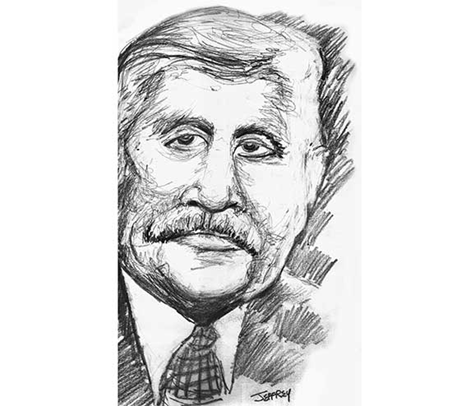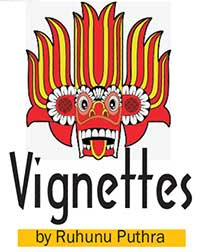The late D.S. Senanayake, the father of the Free Nation – by Ruhunu Puthra

Here are some snippets about the late D.S. Senanayake, the father of the Free Nation that was born on February 4, 1948. His 136th birth anniversary falls on October 20, 2020. On October 20 were also born Mahathma Gandhi, the Father of Modern India and Sir Oliver Goonetilleke who, together with D.S., shaped the destiny of our country.
With D.S. it was “Colombo giyath, gama Botale,” meaning his resounding successes in Colombo did not make him forget his native village of Botale. (A rare trait at any time, with many villagers becoming VIPs in Colombo and immediately breaking all ties with their kith and kin and village).
Yes, he was always a son of he soil, with the native wit Sri Lankans are famous for, and sound commonsense or, as some call, it, horsesense. He was fiercely loyal to his men, his friends and his ‘gama’ and also to his old school. At a S. Thomas’ College Old Boys’ tamasha, he once said that the first thing he did when he got a diary for a new year was to note in it STC Old Boys’ Day and the two days of the Royal-Thomian Match. At this, a cheeky reporter is supposed to have asked him, “Sir, with you what comes first your country or your school?” And DS had replied with that throaty laugh of his, “My country, but by a short head!”.
The boy, D.S., who announced proudly to his father that he was the fourth in his class (‘Loku aiya’ Frederick Richard ‘F. R.’ Senanayake later pointed out that there were only four boys in the class) was not very fond of the cloistered atmosphere of the classroom, and would slip out at every opportunity, to wander around the school garden. One day, Warden Stone saw him, and calling up the errant student, said sharply, “What is this, Senanayake? You seem to be everywhere?” And young D.S. replied blandly, “Yes sir, just like God!”
D.S.’s greatest pal, in his schooldays, was Douglas de Saram, and one day, going to D.S.’s parental home, by train, they jumped out of it at Mirigama as the train did not stop there. They were arrested, produced in courts and discharged with a warning. As a student at STC, then at Mutwal, tough and mighty D.S. would oblige his friend by climbing a coconut tree, in the school garden, and bringing down an entire bunch of ‘Kurumba’, lest the sound of falling nuts should attract the attention of the teachers and prefects.
D.S. was very fond of Maldivian ‘diyahakuru and bondihalwa’ and would quite often board the Maldivian boats to get them. He was nicknamed ‘Kela John’ (Jungle John) by his friends.
 When Douglas de Saram captained S. Thomas’ College, in the big matches of 1901 and 1902, D.S. Senanayake kept wickets for his school. Both his sons Dudley and Robert played cricket for S. Thomas’ College. Whenever he found the time, D.S. went to see his sons at play and joined the cheering squad.
When Douglas de Saram captained S. Thomas’ College, in the big matches of 1901 and 1902, D.S. Senanayake kept wickets for his school. Both his sons Dudley and Robert played cricket for S. Thomas’ College. Whenever he found the time, D.S. went to see his sons at play and joined the cheering squad.
After leaving school, D.S. served in the Government Survey Department, as a clerical hand. It was a Department that came under his control, years later, when he became the Minister of Agriculture and Lands. D.S. was going through a bad time. His worried father, Mudliyar Don Spater Senanayake consulted a prominent Buddhist monk, in Tangalle, who was a renowned astrologer. The monk studied D.S.’s horoscope and reassured the Mudliyar that there was nothing very serious to worry about and that when the boy’s malefic period was done, there would be no stopping him.
“He will rise slowly but steadily to the highest position in the country,” said the venerable monk. The Mudliyar scoffed at this rash prediction, for D.S. was very backward in his studies and considered the dunce of the family. “If you said that of my elder son F.R., I might have believed it,” said Mudliyar Senanayake. “Our country is under the British Raj now, with no sign of Independence within sight”.
Once D.S. told newsmen, who had gathered in his ancestral walawwa, in Botale, that many of the coconut trees, in the spacious garden, had been planted by himself. A very humane person, when a fellow villager got small-pox and nobody would go anywhere near the stricken man, D.S. promptly went into the man’s hut, heaved the man on to his shoulders and took him to hospital. Upon returning home, he rubbed some lime on his body, had a bath at the open well in the garden, and that was the end of the matter.
When he was manager of the plumbago mines, that belonged to his brother F.R., he found that many of the workers – huge, hefty fellows all of them – got involved in drunken brawls on payday. With a thick cudgel in his hand, he would go round the ‘wadiyas’ settling the fights. In Botale, his native village, hardly anyone ever went to courts. They would all come to D.S., who settled their disputes to the satisfaction of everybody concerned.
D.S. loved the rustic life and the company of the simple villager. As a young man, he would join the cart caravans bringing the Senanayake estate produce to Colombo, and he would sing the famous ‘Karatta-Kavi’, along with the carters. When he was imprisoned for 46 days, during the riots of 1915, he whiled away his time singing these ‘kavi’. Of course, what his fellow prisoners thought of this is not known.
Always loyal to his employees, D.S. was once in the Negombo Courts, where one of his men was the accused in a certain case. Spotting him, the Magistrate, an Englishmen said, “Mr. Senanayake, why don’t you come and sit at the Bar Table?” While the case was going on, the Magistrate told D.S. that he could cross-examine the prosecution witness and D.S. did so, to devastating effect. When the case was over and D.S.’s man discharged, some members of the Negombo Bar protested to the Magistrate. “That man is no lawyer,” they said. “Why did you allow him to cross-examine?” “No lawyer?” gasped the Magistrate aghast. “But, good God, I thought he was Mr. F. R. Senanayake, Barrister-at-Law!”
D.S. never gave in to opposition if he felt that anything was good for his country and his people. When he was in the Legislative Council, he proposed that the trout streams in Nuwara-Eliya, which was then the sacred preserve of the European Club, should be made open to the public. The club had introduced not only trout, but other varieties of fish, and at D.S.’s proposal, a European member jumped to his feet and roared, “Who put the fish there?” D.S. turned to the man and retorted. “Who put the streams there?”
In the year 1936, a gramophone record of the first Sinhala song, so melodiously, sung by the then 18-year-old Mohideen Beig and K. K. Rajalakshmi, was released. The song was composed by U. D. Perera and set to music by Mohamed Ghouse. They presented their first record to D.S., who was then the Minister of Agriculture and Lands, at his residence. D.S. summoned the entire household, including the domestic aids, and played it on his gramophone.
“Karuna Muhude Namu Gilila,
Prema Manohara Geetha Gayala….”
D.S. was no communalist, and his Tamil, Muslim and Burgher friends were many. In fact, when he was capped in jail, his Power-of-attorney was held by one of his friends, S. Sanmugum. It is said that D.S. met Oliver Goonetilleke quite by chance at the Orient Club one evening. It was the first time they had met, and it was the beginning of an association that was to shape the destiny of our country. Unkind critics of Sir Oliver said that he never left anything to chance, and, shrewd and far-sighted man that he was, he is sure to have engineered that ‘chance’ meeting.
He, with his shrewd and keen intelligence, pulled Sri Lanka out of many a messes she got into, thanks to the bungling stupidity and crass selfishness some of her politicians. In the mid 1940s, the British government sent the Soulbury Commission to Ceylon to explore the possibility of drafting a constitution that would give our people a greater say in the government of our country. Although D.S., the then leader of the State Council, and the ministers, at first boycotted the sittings of the Commission, D.S. was persuaded by Sir Oliver Goonetilleke (Sometimes referred to as “the wise old owl”) to make friendly overtures to Lord Soulbury.
They became good friends and when Lord Soulbury evinced a desire to see the country and assess for himself the living standards and the educational level of the ordinary people of our country, D.S. volunteered to show his Lordship around himself. So, one morning, Lord Solubury found himself seated next to D.S., driving up to Kandy in D.S.’s official limousine.
They passed the Kegalle town and were going through vast tracts of paddy fields. It being the Maha Season, the farmers were busy ploughing the paddy fields.
“Shall we stop for a moment and stretch our legs?” asked D.S. and Lord Soulbury nodded in agreement. Then they got out and watched the busy ploughmen. “Would you like to speak to one of them?” asked D.S. and once again Soulbury nodded in agreement. The rest of the story is described in the ‘Best of Amita’ book thus:
“Oi!” shouted D.S., in his stentorian voice. “Thamusela ekkenek mehe enawada poddak” (Will one of you come here for a moment”)
A burly middle-aged ploughman looked up and, handing his plough to another farmer, walked up to the distinguished duo. The farmer was bathed in mud but his bearing was proud and dignified.
“This is Lord Soulbury who has come here from England,” explained D.S. in Sinhala. “He wishes to speak to you. I’ll translate what he says into Sinhala, and what you say into English.”
To everybody’s astonishment, the farmer said in impeccable English: “That won’t be necessary, Mr. Senanayake. I’ll converse with his lordship in English.”








No Comments